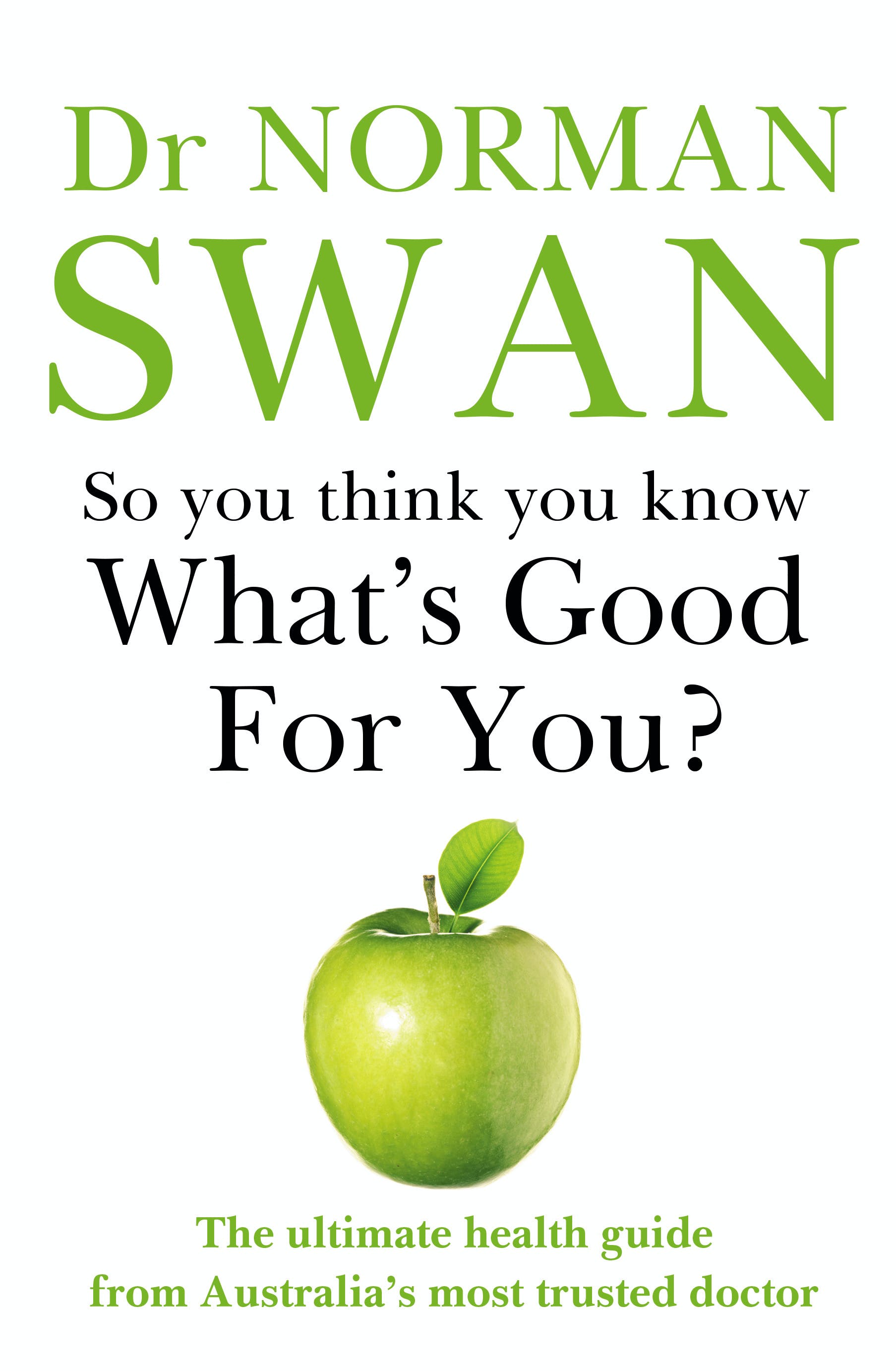Dr Swan on barrister health

Talitha Fishburn spoke to Dr Norman Swan following his insightful 2021 publication So you think you know What’s Good For You?' and asked when it comes to barristers, what are some important health considerations.
Talitha Fishburn (TF): Dr Swan, what are your thoughts on the health implications of stress, noting the day in the life of a barrister might throw up a 'curve ball' or two?
Dr Norman Swan (Dr Swan): Some stress is normal. It can improve performance and assist with deadlines. But chronic unrelenting stress is toxic. That type of chronic stress shortens life. It increases the risk of coronary heart disease or cancer. It flushes the body with dangerously high levels of cortisol. This can impact much of the body including the immune system. Stress actually affects the brain and neurotransmitters. It impacts mood, memory and how the immune and cardiovascular systems operate. So my advice to 'avoid chronic stress' is not some sort of namby-pamby, alternative thing. There is hard science behind it. We tend to think of the brain as separate from the body. But it is all connected. The mind and the body are one. What goes in your mind affects the rest of your body and what goes on in your body affects your mind.
TF: When it comes to chronic stress, how would you recommend a barrister try to avoid it?
Dr Swan: Chronic stress comes from a feeling of lacking control. So, to avoid it, you need to be able to feel that you are in control of your life rather than feeling that external circumstances are directing how you work and live. It is about the 'locus of control'. The higher the pressure on you and the narrower your latitude in making decisions, the more the locus of control is somewhere else out there, for example, with the client, with the other barrister, with the court, with the family, and so on. I can imagine it might be very hard especially for a junior barrister who is juggling multiple cases and clients. But you’ve got to find ways of bringing that sense of control back to yourself. This means deciding what your limits are and deciding what you’re prepared to take on. For instance, pushing back if you can when you’re being ‘dumped’ on. And sticking to that. For senior counsel, it means you need to understand how toxic it can be if you don’t consider this in your style of work with juniors.
TF: What about the adrenalin that might be surging in an urgent hearing, can that be harmful?
Dr Swan: The adrenalin pumping moments of short-term acute stress are not ideal but I suspect that is what some advocates like about some court work. Most of us recover quickly from this kind of stress and largely stay in control. There are some risks in older, less healthy barristers who may have underlying conditions such as heart disease and not know it. Research in Melbourne has shown that rapid rises in acute stress can bring on heart attacks. The more sinister thing is chronic stress and that comes from a feeling of being out of control of your life. That is the thing to try to get sorted out as a priority.
TF: What do you regard as a 'non-negotiable' when it comes to health?
Dr Swan: Cigarettes. You simply have to give up cigarettes. It is non-negotiable. There are ways to do it including medications to help quit smoking many of which are underutilised. If you smoke any number of cigarettes a day, it is a problem. It has to be zero. It is not ok to 'cut down' to, say, five a day. The first 10 cigarettes are the most dangerous. The graph goes up really steeply with the first 10. Quitting really means quitting.
TF: Alcohol is not a stranger at many a legal function. What are your thoughts on alcohol consumption?
Dr Swan: With alcohol, it is not so much about abstinence, but about really cutting back. Enjoy alcohol but in moderation and don’t ever assume it is benign. There are some ways of moderating alcohol intake at Friday night drinks. Always start with a sparkling water and take your time with it. Then pour a small glass of alcohol. Another thing to try, and some people swear by it, is a month of no alcohol. In that month, see how much better you feel. Also do a health audit to determine whether you’re using alcohol to relieve stress rather than drinking for recreation. For example, if you go on a holiday and you’re not consuming as much alcohol, it could be job related. If you are 'self-medicating' with alcohol, that is not good news. It is then no longer recreation and the drinking needs to be addressed as a priority.
TF: What can time-poor barristers do for better health?
Dr Swan: Time pressed barristers can counteract the sedentary behaviour of the working day by doing a shock type workout. One example is the 'seven-minute workout'. You build up to it, but at its optimal, it is an intense 7-minute workout. It does work. No one’s got an excuse not to do at least 7 minutes of exercise a day. Even if you have a totally full calendar, it is not something you should sacrifice. It makes a big difference to your physical and psychological health. If you have not done exercise for a while, start with a gentle version then build up to a faster and harder version. The good thing about it is that it is strength as well as aerobics. There are apps which give a variety of short intense workouts that include aerobic conditioning and muscle strengthening – which is critical for good health moving forward.
TF: And what about days when there is a bit more time on our hands?
Dr Swan: I think it is always good to get outside for 30 to 45 minutes. Have a small dose of sun and reset your body clock. Walking is aerobic exercise but try not to amble. Get the heart rate up a bit. I increasingly have outdoor walking meetings and recommend them to others if logistically possible.
TF: What are some essential healthy eating habits for barristers?

Dr Swan: It can be very difficult to control what you’re eating when you’re busy. You should do an audit of your diet. There are food diary apps that are good for this. For example, you should examine how much red meat you’re eating a week. As a first step, try to halve the intake of red meat. You should be eating more plants. Try at least a day a week of eating less food than you normally would; it need not be a fast. This creates some metabolic stress which is good for you. Ultimately, the diet should be about shifting to more plant-based nutrition and avoiding as much red meat as possible. There is a link between red meat consumption and colon cancer as well as heart disease, stroke and diabetes. Don’t be afraid of a bit of hunger. It improves the action of insulin, may reduce heart risk factors, helps nerve growth in the brain and suppresses chemical messengers that can make cancers grow.

TF: The law term ends in mid-December ushering in a 5-week holiday. What are your thoughts on using the holiday period to 'reset' and focus on healthier habits for the year ahead?
Dr Swan: In the history of humankind has any New Year’s resolution ever lasted into February? New Year resolutions should be today’s resolutions. If you want to change something, the time to do it is now. This applies even if you are running full pelt. Doing three or four simple healthy steps that can be implemented every day will do a lot better for you than a major reset over the summer holiday. Whatever you do in the five-week break will not be sustained beyond the second week of the law term when the old patterns return. I guarantee this and am prepared to put money on it. So, start with simple healthier habits today.
TF: Do you have any tips to help sticking to healthy habits?
Dr Swan: I enter regular diary reminders in my phone. They prompt me on some of the things so that I don’t need to rely on automatic behaviour change. I use technology to ping me to do healthy stuff!
TF: What is your advice about losing weight to avoid needing to buy new robes?
Dr Swan: If you want to lose weight, there are two major things to keep in mind. One is portion size and the other is keeping a food diary to record what you are eating. Recording your consumption will shock the living day lights out of you in terms of awareness of what you’ve consumed.
TF: What about barristers and burnout? What are some ways to identify and manage burnout?
Dr Swan: The hallmark of burnout is fatigue and the feeling that you’re not doing a good job or being very effective and you might be feeling detached from work. Burnout is associated with chronic stress. I don’t have any magic answers. It is hard for barristers because you are working as a sole trader and when the work is on it is on. You should try to find a mutually supportive group or mentor who can guide you through it. From what I gather, new barristers get some of that support, but it can drop away as you become more senior. The bottom line is, you’ve got to have somebody that you can sit down and talk to about the burnout and how you can get through that moment and work out some sustainable limits. Then there are the practical steps, in particular, intense exercise. When you’re stretching your body on a regular basis this helps to get beyond the burnout. But simply taking a holiday won’t address the fundamental issues when you return to work.
TF: What can barristers do in lieu of reaching for yet another coffee?
Dr Swan: Having a coffee in the morning is fine. But when you are feeling that afternoon lag avoid having the extra coffee. It will not revive you. Coffee gives you an artificial sense of stimulation. Instead, take a quick nap. Just 15-20 minutes. It will transform your day.
TF: If you had to say what is the 'Good, bad and ugly' about barristers’ health, what would it be?
Dr Swan: The 'good' is that you’re a highly educated group. And highly educated people tend to live longer. You are also middle class meaning you tend to live in good accommodation with access to proper nutrition and health services. So the general health predictions are positive. The 'bad' and the 'ugly' are the same; it is the possibility for chronic stress arising from a lack of control having regard to the often unpredictable and intense nature of barristers’ work when left unchecked.
TF: What is worse, sugar or salt?
Dr Swan: I will have to think about that. But probably salt. Yet solving the problem of reducing salt intake is probably easier than avoiding sugar. If you cut back on processed foods and reduce your portions, you’ll instantly cut back on substantial salt intake and not really need to think about it too much. But reducing sugar is something you really must act on and think about. It is very easy to consume vast amounts of sugar very quickly with sweetened foods, especially beverages. Evidence suggests that sugar stresses the insulin system and is strongly linked to obesity, diabetes and probably cancer. The bottom line: neither is good. Try to avoid both.